
Journal Menu
► ▼ Journal Menu-
- Energies Home
- Aims & Scope
- Editorial Board
- Reviewer Board
- Topical Advisory Panel
- Instructions for Authors
- Special Issues
- Topics
- Sections & Collections
- Article Processing Charge
- Indexing & Archiving
- Editor’s Choice Articles
- Most Cited & Viewed
- Journal Statistics
- Journal History
- Journal Awards
- Society Collaborations
- Conferences
- Editorial Office
Journal Browser
► ▼ Journal BrowserNeed Help?
Announcements
31 July 2025
Energies | Most Viewed Papers in 2024 (III)
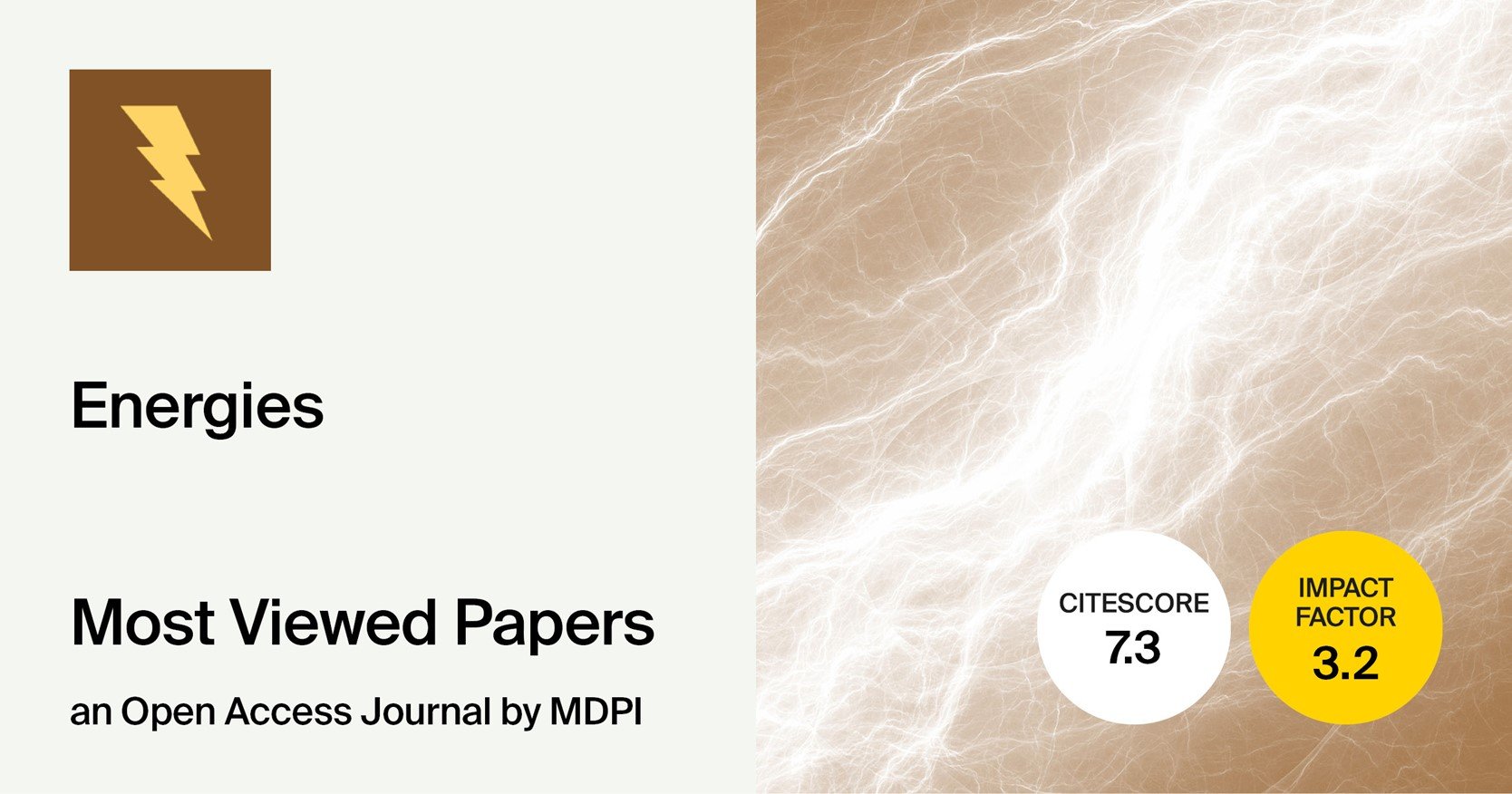
1. “Exploring Hydrogen Embrittlement: Mechanisms, Consequences, and Advances in Metal Science”
by Dinara Sobola and Rashid Dallaev
Energies 2024, 17(12), 2972; https://doi.org/10.3390/en17122972
Available online: https://www.mdpi.com/1996-1073/17/12/2972
2. “Review of Cell-Balancing Schemes for Electric Vehicle Battery Management Systems”
by Adnan Ashraf, Basit Ali, Mothanna S. A. Alsunjury, Hakime Goren, Halise Kilicoglu, Faysal Hardan and Pietro Tricoli
Energies 2024, 17(6), 1271; https://doi.org/10.3390/en17061271
Available online: https://www.mdpi.com/1996-1073/17/6/1271
3. “A Comprehensive Review of Nanotechnology Applications in Oil and Gas Well Drilling Operations”
by Alhaitham M. Alkalbani and Girma T. Chala
Energies 2024, 17(4), 798; https://doi.org/10.3390/en17040798
Available online: https://www.mdpi.com/1996-1073/17/4/798
4. “A Review on the Anaerobic Co-Digestion of Livestock Manures in the Context of Sustainable Waste Management”
by Rahul Kadam, Sangyeol Jo, Jonghwa Lee, Kamonwan Khanthong, Heewon Jang and Jungyu Park
Energies 2024, 17(3), 546; https://doi.org/10.3390/en17030546
Available online: https://www.mdpi.com/1996-1073/17/3/546
5. “Using Solar PV and Stationary Storage to Buffer the Impact of Electric Minibus Charging in Grid-Constrained Sub-Saharan Africa”
by Johan H. Giliomee, Brendan G. Pretorius, Larissa Füßl, Bernd Thomas and Marthinus J. Booysen
Energies 2024, 17(2), 457; https://doi.org/10.3390/en17020457
Available online: https://www.mdpi.com/1996-1073/17/2/457
6. “LSTM-Autoencoder Deep Learning Model for Anomaly Detection in Electric Motor”
by Fadhila Lachekhab, Messouada Benzaoui, Sid Ahmed Tadjer, Abdelkrim Bensmaine and Hichem Hamma
Energies 2024, 17(10), 2340; https://doi.org/10.3390/en17102340
Available online: https://www.mdpi.com/1996-1073/17/10/2340
7. “Overview on Permanent Magnet Motor Trends and Developments”
by Vasileios I. Vlachou, Georgios K. Sakkas, Fotios P. Xintaropoulos, Maria Sofia C. Pechlivanidou, Themistoklis D. Kefalas, Marina A. Tsili and Antonios G. Kladas
Energies 2024, 17(2), 538; https://doi.org/10.3390/en17020538
Available online: https://www.mdpi.com/1996-1073/17/2/538
8. “A Review of Passive Solar Heating and Cooling Technologies Based on Bioclimatic and Vernacular Architecture”
by Julia Lima Toroxel and Sandra Monteiro Silva
Energies 2024, 17(5), 1006; https://doi.org/10.3390/en17051006
Available online: https://www.mdpi.com/1996-1073/17/5/1006
9. “Economic Dispatch Optimization Strategies and Problem Formulation: A Comprehensive Review”
by Fatemeh Marzbani and Akmal Abdelfatah
Energies 2024, 17(3), 550; https://doi.org/10.3390/en17030550
Available online: https://www.mdpi.com/1996-1073/17/3/550
10. “Cooling Techniques for Enhanced Efficiency of Photovoltaic Panels—Comparative Analysis with Environmental and Economic Insights”
by Tarek Ibrahim, Mohamad Abou Akrouch, Farouk Hachem, Mohamad Ramadan, Haitham S. Ramadan and Mahmoud Khaled
Energies 2024, 17(3), 713; https://doi.org/10.3390/en17030713
Available online: https://www.mdpi.com/1996-1073/17/3/713
30 July 2025
Meet Us Virtually at the 1st International Online Conference on Inventions—Energy Security and Sustainable Development, 25–26 June 2026
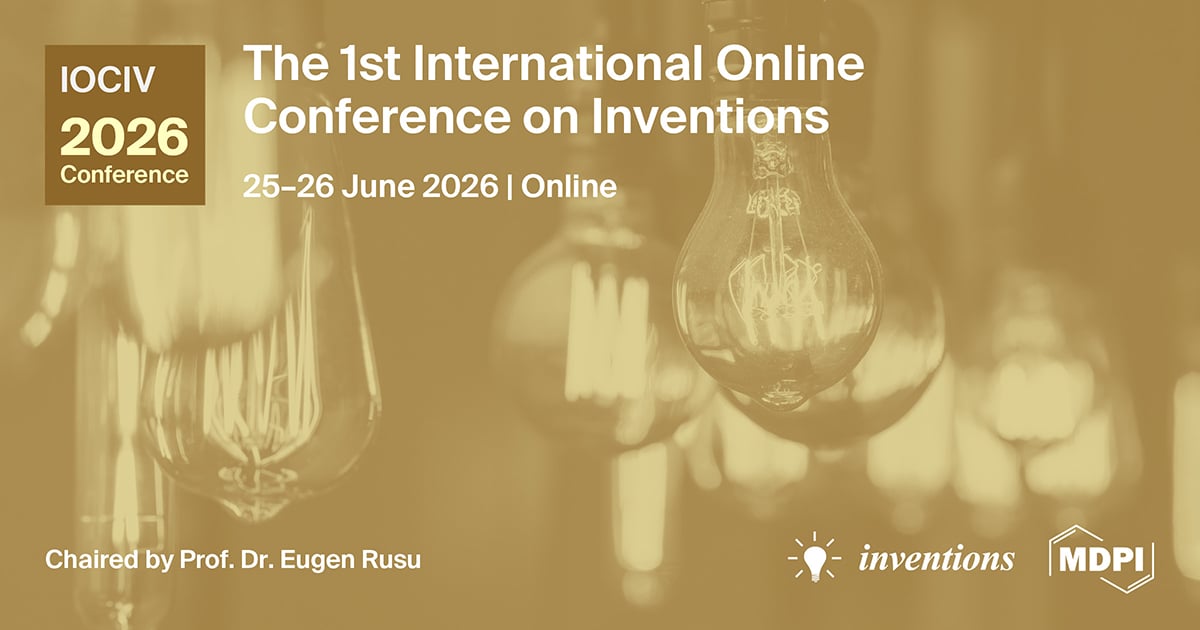
We cordially invite you to attend the 1st International Online Conference on Inventions—Energy Security and Sustainable Development organized by MDPI Inventions (ISSN: 2411-5134). It will take place virtually from 25 to 26 June 2026.
Conference Chair: Prof. Dr. Eugen Rusu, Department of Mechanical Engineering, University Dunarea de Jos of Galati, Romania
The topics of interest:
S1. Energy transition, decarbonization, and environmental policy;
S2. Advanced sustainable energy conversion systems;
S3. Energy system analysis and modeling;
S4. Advances and challenges in extracting offshore energy;
S5. Hydrogen and other strategies to decarbonize energy systems.
Important dates:
Abstract Submission Deadline: 27 February 2026;
Abstract Acceptance Notification: 27 March 2026;
Free Registration Deadline: 22 June 2026.
Guide for authors:
To submit your abstract, please click on the following link: https://sciforum.net/user/submission/create/1468.
To register for the event, please click on the following link: https://sciforum.net/event/IOCIV2026?section=#registration.
For details regarding Abstract Submission, Poster and Slide Submission, and Publication Opportunities, you may refer to the “Instructions for Authors” section: https://sciforum.net/event/IOCIV2026?section=#instructions.
For any enquiries regarding the event, please contact iociv2026@mdpi.com.
We look forward to seeing you at the 1st International Online Conference on Inventions—Energy Security and Sustainable Development.
29 July 2025
Energies | 2025 Google Scholar Metrics Released
We are pleased to announce that Energies (ISSN: 1996-1073) ranked 10th under the subcategory “Sustainable Energy” in the latest released 2025 Google Scholar Metrics on 22 July 2025. The latest release covers papers published from 2020 to 2024 and includes citations from all articles that were indexed in Google Scholar as of July 2025.
The h5-index of Energies is 148, and the h5-median is 197. We express our gratitude to all the editors, reviewers, authors and readers of Energies for your support for the journal.
|
|
(source: 2025 Google Scholar Metrics)
You are welcome to browse the most cited publications over the last 5 years here.
Please feel free to contact us at energies@mdpi.com if you have any questions or suggestions for Energies.
Supplementary explanations:
- Scholar Metrics—provide an easy way for authors to quickly gauge the visibility and influence of recent articles in scholarly publications;
- h5-index—The h5-index is the h-index for articles published in the last 5 complete years. H articles published in 2020-2024 have at least h citations each;
- h5-median—The h5-median for a publication is the median number of citations for the articles that make up its h5-index.
28 July 2025
Energies | Most Viewed Papers in 2024 (I)
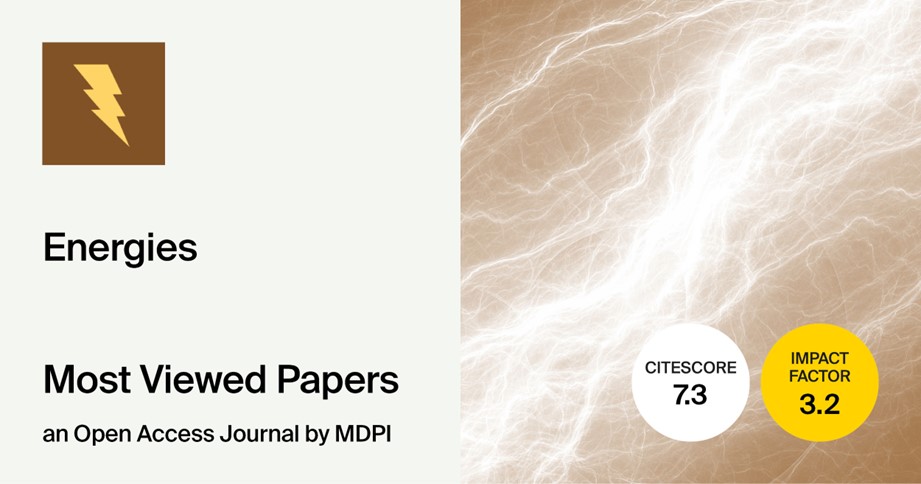
1. “Hydrogen Safety Challenges: A Comprehensive Review on Production, Storage, Transport, Utilization, and CFD-Based Consequence and Risk Assessment”
by Marcella Calabrese, Maria Portarapillo, Alessandra Di Nardo, Virginia Venezia, Maria Turco, Giuseppina Luciani and Almerinda Di Benedetto
Energies 2024, 17(6), 1350; https://doi.org/10.3390/en17061350
Available online: https://www.mdpi.com/1996-1073/17/6/1350
2. “Assessing the Costs of Commercialising Tidal Energy in the UK”
by Donald R. Noble, Kristofer Grattan and Henry Jeffrey
Energies 2024, 17(9), 2085; https://doi.org/10.3390/en17092085
Available online: https://www.mdpi.com/1996-1073/17/9/2085
3. “Hydrogen-Powered Vehicles: Comparing the Powertrain Efficiency and Sustainability of Fuel Cell versus Internal Combustion Engine Cars”
by Kirill Durkin, Ali Khanafer, Philip Liseau, Adam Stjernström-Eriksson, Arvid Svahn, Linnéa Tobiasson, Tatiana Santos Andrade and Jimmy Ehnberg
Energies 2024, 17(5), 1085; https://doi.org/10.3390/en17051085
Available online: https://www.mdpi.com/1996-1073/17/5/1085
4. “Energy Forecasting: A Comprehensive Review of Techniques and Technologies”
by Aristeidis Mystakidis, Paraskevas Koukaras, Nikolaos Tsalikidis, Dimosthenis Ioannidis and Christos Tjortjis
Energies 2024, 17(7), 1662; https://doi.org/10.3390/en17071662
Available online: https://www.mdpi.com/1996-1073/17/7/1662
5. “Enhancing the Performance of Savonius Wind Turbines: A Review of Advances Using Multiple Parameters”
by Anesu Godfrey Chitura, Patrick Mukumba and Ndanduleni Lethole
Energies 2024, 17(15), 3708; https://doi.org/10.3390/en17153708
Available online: https://www.mdpi.com/1996-1073/17/15/3708
6. “The Influence of the Global Energy Crisis on Energy Efficiency: A Comprehensive Analysis”
by Bożena Gajdzik, Radosław Wolniak, Rafał Nagaj, Brigita Žuromskaitė-Nagaj and Wieslaw Wes Grebski
Energies 2024, 17(4), 947; https://doi.org/10.3390/en17040947
Available online: https://www.mdpi.com/1996-1073/17/4/947
7. “Electric Vehicles—An Overview of Current Issues—Part 1—Environmental Impact, Source of Energy, Recycling, and Second Life of Battery”
by Marek Guzek, Jerzy Jackowski, Rafał S. Jurecki, Emilia M. Szumska, Piotr Zdanowicz and Marcin Żmuda
Energies 2024, 17(1), 249; https://doi.org/10.3390/en17010249
Available online: https://www.mdpi.com/1996-1073/17/1/249
8. “E-Fuels: A Comprehensive Review of the Most Promising Technological Alternatives towards an Energy Transition”
by Sonia Dell’Aversano, Carlo Villante, Katia Gallucci, Giuseppina Vanga and Andrea Di Giuliano
Energies 2024, 17(16), 3995; https://doi.org/10.3390/en17163995
Available online: https://www.mdpi.com/1996-1073/17/16/3995
9. “Reinforcement Learning Model-Based and Model-Free Paradigms for Optimal Control Problems in Power Systems: Comprehensive Review and Future Directions”
by Elinor Ginzburg-Ganz, Itay Segev, Alexander Balabanov, Elior Segev, Sivan Kaully Naveh, Ram Machlev, Juri Belikov, Liran Katzir, Sarah Keren and Yoash Levron
Energies 2024, 17(21), 5307; https://doi.org/10.3390/en17215307
Available online: https://www.mdpi.com/1996-1073/17/21/5307
10. “AI-Driven Innovations in Building Energy Management Systems: A Review of Potential Applications and Energy Savings”
by Dalia Mohammed Talat Ebrahim Ali, Violeta Motuzienė and Rasa Džiugaitė-Tumėnienė
Energies 2024, 17(17), 4277; https://doi.org/10.3390/en17174277
Available online: https://www.mdpi.com/1996-1073/17/17/4277
23 July 2025
Interview with Dr. Zhengmao Li—Winner of the Energies Outstanding Reviewer Award

The Outstanding Reviewer Award is given annually in recognition of reviewers who generously contribute their time to reviewing papers and display thoroughness, professionalism, and timeliness in doing so.
We spoke with Dr. Zhengmao Li, winner of the Energies 2024 Outstanding Reviewer Award, to hear his opinions and ask about his experiences with scientific research and awards.
Name: Dr. Zhengmao Li
Affiliation: Aalto University, Finland
Research interests: combined heat and power; hydrogen; multi-energy system planning and operation
1. Could you give a brief introduction of yourself to the readers?
My name is Zhengmao Li, and I am an assistant professor at Aalto University. I work in the power and energy area, with a focus on smart grids and hydrogen. Thank you for the award, and I am happy to contribute further to the journal.
2. How was your experience reviewing for Energies?
My experience was excellent, first of all because Energies has a strong focus on its responsibility to authors and readers. For example, if a reviewer misses a deadline, the system will send a reminder. This is very helpful, because we are very busy, but this mechanism guarantees that the review is submitted on time. This also ensures that the process will stay on track. This shows respect for the authors’ work, and I hope all MDPI journals use this mechanism.
3. Do you have any suggestions for improving our review process?
The current system works very well, and if I were to suggest something, it would be to focus on reviewers who are experts on the topic of the paper. If more related research could be recommended to me, I would be more than happy to accept the invitations.
4. In your opinion, which research topics will be of particular interest to the research community in the coming years?
Some interesting topics will be energy systems, energy management and optimization, smart grid, and AI applications in energy systems.
5. What motivated you to participate actively in the peer review process, and what do you find most rewarding about it?
This gives me the opportunity to learn new things and broaden my perspective; the peer review process helps me grow as a researcher.
6. How do you manage your time and balance your responsibilities as a researcher and a reviewer?
My primary focus is my research; however, I like to integrate reviewing into my work when I need a break or a change in pace. It is a very good way of recharging while also engaging in meaningful academic work.
7. What advice would you give to early career researchers who are starting to participate in peer reviews?
The most important aspect is not to treat reviewing responsibilities as a burden but as a learning opportunity. It is a good chance to cultivate and deepen our research understanding.
8. How do you see the role of reviewers evolving with the advancements in artificial intelligence and automated tools in research publishing?
AI can be a useful tool for improving language and summarizing the main contents of a text. AI cannot replace a human when it comes to evaluating the scientific contribution of a paper or making editorial decisions. The peer review process will still rely heavily on human experience and judgement, and it will be strongly influenced by experience.
17 July 2025
Interview with Dr. Bozena Gajdzik—Winner of the Energies Outstanding Reviewer Award
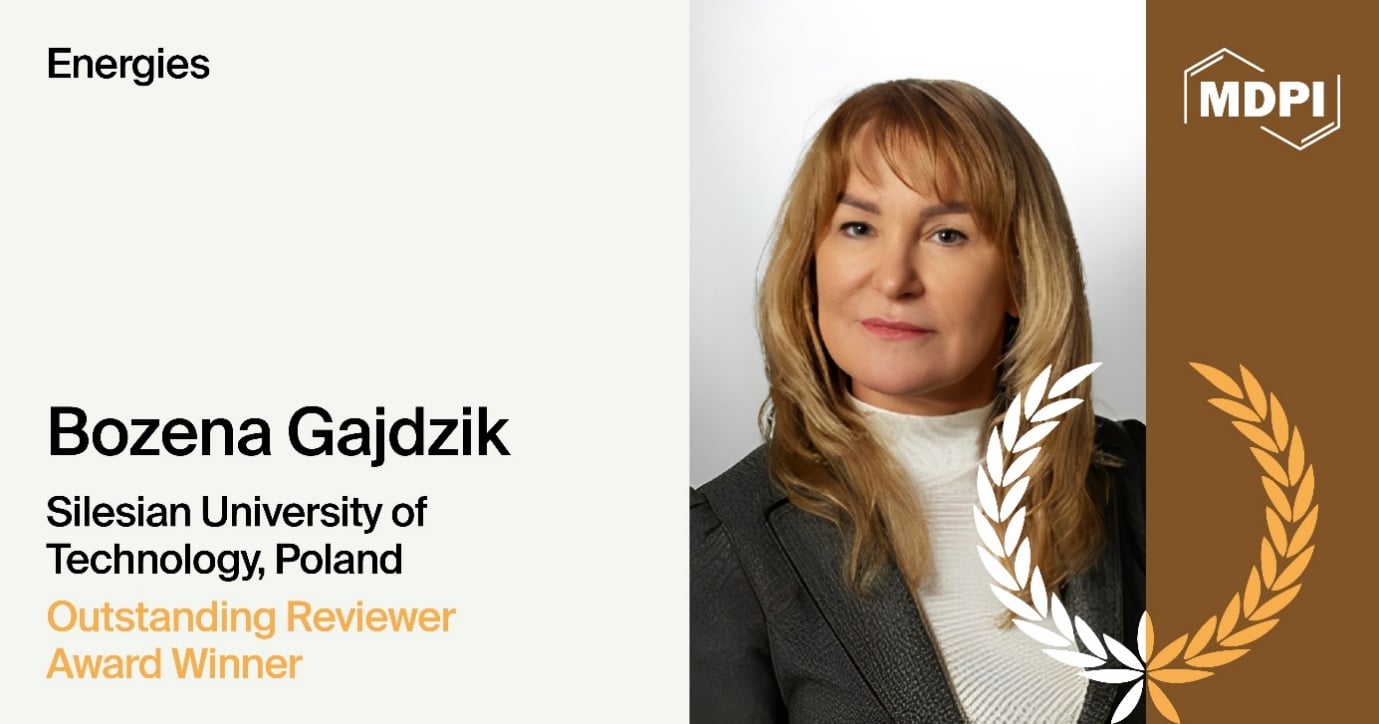
The Outstanding Reviewer Award is given annually in recognition of reviewers who generously contribute their time to reviewing papers and display thoroughness, professionalism, and timeliness in doing so.
We spoke with Dr. Bozena Gajdzik, winner of the Energies 2024 Outstanding Reviewer Award, to hear her opinions and about her experiences with scientific research and awards.
Name: Dr. Bozena Gajdzik
Affiliation: Silesian University of Technology, Gliwice, Poland
Research interests: management; digitalization; Industry 4.0; industrial transformation; sustainability
Below is a short interview with one of the winners—Dr. Bozena Gajdzik:
1. Could you give a brief introduction of yourself to the readers?
My name is Bożena Gajdzik. I am a scientist from Poland; since 2008, I have started engaging with foreign journals (with IF). Two years later (2010), my cooperation with MDPI began, as a reviewer and as an author of scientific publications. In the review preferences, I chose Energies because climate policy has entered a radical era of changes. As a scientist (a steel industry expert in the Polish market), I want to participate in the process of industrial transition to Net Zero (for the good of us all). While reviewing scientific papers for Energies, I was able to learn about many aspects and determinants of the ongoing transformation, not only in Europe, but also outside Europe. They did not always share the same views, due to differences in climate transformation models between continents, but it was worth learning about them. Now, as a scientist, I have a broader view of the world’s energy policy.
2. How was your experience reviewing for Energies?
My experience with Energies is positive. First of all, I appreciate the high quality of scientific publications from all over the world, and in addition, I find the peer review system used by MDPI clear.
3. Do you have any suggestions for improving our review process?
There are no comments regarding the quality of the review system and the procedures used. I recommend that other scientists familiarize themselves with this peer review system and participate in the development of the journal.
4. In your opinion, which research topics will be of particular interest to the research community in the coming years?
In the coming years, energy transformation will continue to be the number one topic. Energy transformation is a complex process that poses numerous challenges to countries (economies, societies and industries). Therefore, we can expect the development of the energy transformation topic. Practitioners and theoreticians of energy transmission still have a lot to say (and write).
5. What motivated you to participate actively in the peer review process, and what do you find most rewarding about it?
My motivation to cooperate with Energies was based on the high quality of scientific papers and their current topics related to the problems of the world. The world faces numerous political, economic, and social challenges due to climate change and energy transformation.
6. How do you manage your time and balance your responsibilities as a researcher and a reviewer?
Time management? We always lack it, but I like the cooperation with Energies because thanks to it I absorb new knowledge published by other scientists, so I can develop scientifically and review at the same time (two in one, so I save time, or so I think).
7. What advice would you give to early career researchers who are starting to participate in peer reviews?
My advice to beginner reviewers is to try to systematically review thematic papers and you will gain additional knowledge for your development.
8. How do you see the role of reviewers evolving with the advancements in artificial intelligence and automated tools in research publishing?
Artificial Intelligence (AI) helps, but it is worth knowing the ethical policies of individual journals and using AI in accordance with the publisher's expectations.
14 July 2025
Meet Us at the 76th Annual Meeting of the International Society of Electrochemistry, 7–12 September 2025, Mainz, Germany
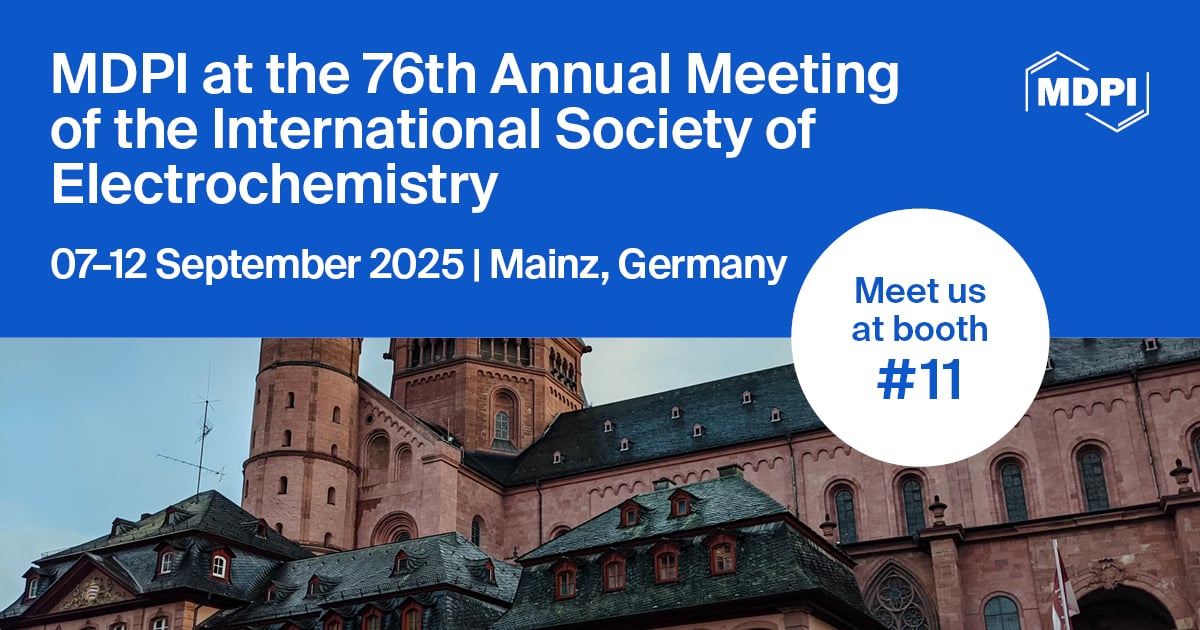
Conference: 76th Annual Meeting of the International Society of Electrochemistry
Date: 7–12 September 2025
Location: Mainz, Germany
MDPI will be attending the 76th Annual Meeting of the International Society of Electrochemistry as an exhibitor. The event will take place in Mainz, Germany, from 7 to 12 September 2025.
The scientific program offers plenary lectures, symposia, tutorials and forums related to the following fields of electrochemistry:
- Analytical Electrochemistry;
- Analysis in Small Space and Short Time Domains;
- Sensors and Biosensors;
- Batteries, Fuel Cells and Supercapacitors;
- Electrodeposition and Electroplating;
- Corrosion and Passivity;
- Electrochemical Engineering and Technology;
- Innovative Electrolytes: Liquids, Solids and Membranes;
- Environmental Electrochemistry;
- Closing Element Cycles: Recycling and Upcycling;
- Electrocatalysis and Electrolysis of Small Molecules: CO2, Water, N2, etc.;
- Electrosynthesis of High-Value Products;
- Mechanisms in Molecular Electrochemistry;
- Photoelectrochemistry;
- In situ/Operando Characterization of Electrochemical Processes;
- Theoretical and Computational Electrochemistry.
The following MDPI journals will be represented:
- Batteries;
- Energies;
- Surfaces;
- Molecules;
- Physchem;
- Chemistry;
- AppliedChem;
- Electrochem;
- Clean Technol.
If you are attending this conference, please feel free to start an online conversation with us. Our delegates look forward to meeting you in person at booth #11 and answering any questions you may have. For more information about the conference, please visit the following website: https://annual76.ise-online.org/.
4 July 2025
MDPI’s Newly Launched Journals in June 2025
Six new journals covering a range of subjects launched their inaugural issues in June 2025. We are excited to be able to share with you the newest research rooted in the value of open access. We are pleased to present the latest research and to make it accessible to all.
We extend our sincere thanks to all the Editorial Board Members for their commitment and expertise. Each journal is dedicated to upholding strong editorial standards through a thorough peer review process, ensuring impactful open access scholarship.
Please feel free to browse and discover more about the new journals below.
| Journal | Founding Editor-in-Chief | Journal Topics (Selected) |
 |
Prof. Dr. Chang-Pu Sun, China Academy of Engineering Physics, Beijing, China; Computational Science Research Center, China Editorial | View inaugural issue |
quantum information and phenomena; condensed matter physics and statistical physics; atomic, molecular, and optical physics; computational physics and mathematical methods View journal scope | Submit an article |
 |
Prof. Dr. Hualiang Lin, Sun Yat-sen University, China; Prof. Dr. Jose L. Domingo, Universitat Rovira i Virgili, Spain Editorial | View inaugural issue |
green and organic food; green infrastructures; green exercise; environmental impact of the healthcare sector; effects of climate change on human health | View journal scope | Submit an article |
 |
Prof. Dr. Francesco Veglio, University of L’Aquila, Italy Editorial | View inaugural issue |
ultra-pure substances; water purification; air purification; gas purification; inorganic chemical purification; purification technologies View journal scope | Submit an article |
 |
Prof. Dr. Junxing Zheng, Huazhong University of Science and Technology, China Editorial | View inaugural issue |
computer-aided design and engineering; artificial intelligence and machine learning; building information modeling (BIM) and digital twins; robotics and automation in construction; smart sensors and Internet of Things (IoT); intelligent control systems and facilities management View journal scope | Submit an article |
 |
Prof. Dr. Assunta Di Vaio, University of Naples Parthenope, Italy Editorial | View inaugural issue |
sustainability, managerial, and biodiversity accounting; carbon management accounting; corporate social responsibility; artificial intelligence and disclosure View journal scope | Submit an article |
 |
Prof. Dr. Changjun Liu, Sichuan University, China Editorial | View inaugural issue |
bioeffects of electromagnetic waves; electromagnetic science and engineering; microwave, millimeter-wave, and terahertz technologies; metamaterials and metasurfaces; communication, sensing, and networks; energy, power, and sustainable applications; quantum and emerging technologies; artificial intelligence and advanced fabrication View journal scope | Submit an article |
3 July 2025
Meet Us at the 2025 IEEE/ASME International Conference on Advanced Intelligent Mechatronics (AIM2025), 14–18 July 2025, Hangzhou, China

We will attend the 2025 IEEE/ASME International Conference on Advanced Intelligent Mechatronics (AIM2025), which will take place in Hangzhou, China, from 14 to 18 July 2025.
Serving as a leading conference in the field of intelligent mechatronic systems, AIM 2025 is committed to advancing diversity in the technology industry, promoting a culture of inclusion and equity, and welcoming, engaging, and rewarding all who contribute to the field. It will bring together experts and researchers from around the world to exchange views on cutting-edge research outcomes and future developments.
The following open access journals will be represented at the event:
- Machines;
- Inventions;
- Robotics;
- Electronics;
- Designs;
- Journal of Manufacturing and Materials Processing;
- Journal of Low Power Electronics and Applications;
- Hardware;
- Energies;
- Applied Sciences;
- Automation;
- Technologies.
If you plan to attend this conference, please feel free to stop by our booth. Our delegates look forward to meeting you in person to answer any questions you may have!
For more information about the conference, please visit the following link: https://www.aim2025.org/index.html.
2 July 2025
MDPI INSIGHTS: The CEO's Letter #24 - 2024 Impact Factor & CiteScore, MDPI Summits France & USA, Tu Youyou Award

Welcome to the MDPI Insights: The CEO's Letter.
In these monthly letters, I will showcase two key aspects of our work at MDPI: our commitment to empowering researchers and our determination to facilitating open scientific exchange.
Opening Thoughts

MDPI’s 2024 Impact Factor Highlights
For those of our readers who are new to academic publishing, you may have heard some news in June around the Impact Factor release. Every year, typically in June, Clarivate releases its annual Journal Citation Reports (JCR), which include Journal Impact Factors (JIF). This metric is widely used in academic publishing to reflect the average number of citations received by recent articles in each journal.
While Impact Factor is just one of many indicators of journal influence, it remains a major milestone for authors, editors, and publishers. It’s used to assess journal visibility, researcher recognition, and scholarly reach. Throughout our international meetings and events, it’s clear that the Impact Factor is something many of our authors and editorial board members care about, as it can influence where they choose to submit an article and the funding they receive for their research.
“These results reflect the trust that the scholarly community places in MDPI”
MDPI’s 2024 Impact Factor Highlights
- 298 MDPI journals received a Journal Impact Factor.
- 60 journals earned their first-ever Impact Factor
- To put this in perspective: MDPI’s 60 new journal acceptances into the Web of Science was the second highest number of any publisher in 2024, behind Elsevier and ahead of Springer Nature. Our 87% acceptance rate for journals submitted to Web of Science shows the strength of our editorial process and our proven ability to develop journals aligned with Clarivate’s 24 evaluation criteria.
- Notably, Textiles, Mathematics, International Journal of Neonatal Screening, Smart Cities, Systems, and Pharmaceutics ranked in the top 10% in their respective categories, highlighting their growing influence and prestige within their academic fields. This shows that high-quality indexing goes beyond visibility; it upholds credibility and trust.
- 193 MDPI journals are now ranked in the top 50% (Q1/Q2) of their subject categories.
- What does this mean, and why is it important? Journals are ranked by quartiles within their field, based on their Impact Factor. Q1 represents the top 25% of journals in their category, Q2 the next 25%, and so on. Being in Q1 or Q2 shows that a journal is performing well relative to other journals in its category. Authors and institutions often look at quartile rankings when choosing where to publish – it’s an important indicator of visibility and recognition, within its respective category.
- 116 of our previously ranked journals increased their Impact Factor.
- 14 MDPI journals achieved an Impact Factor of 5.0 or higher, suggesting a high degree of influence and visibility.
These results reflect our staff's hard work: from our editorial and production teams to our indexing, communications, and data teams, and beyond. This also reflects the trust that the scholarly community places in MDPI, reinforcing the message that when researchers publish with MDPI, they publish with impact.
Open Access with Impact
As the leading fully open access publisher, our journals have received a total of 18.4 million citations in the Web of Science by the end of 2024, reflecting the growing reach and engagement of research published with MDPI. We are committed to making scientific research freely accessible to everyone, everywhere. With the support of more than 4.2 million contributing authors, we’re proud to support the global shift toward open access.
Further Reading
If you’d like to better understand how journals get indexed and why Impact Factors matter, please read this recent interview with Dr. Constanze Schelhorn (Head of Indexing). It gives you a behind-the-scenes look at the role our indexing team plays in supporting journal indexing and visibility.
You can also read our official news announcement shared last week: MDPI Journals in the 2024 Journal Citation Reports.
Thank you to everyone, from our authors and reviewers to our editors and internal teams, who contributed to the progress of our journal indexing in 2024. We’re continuing to build journals that are recognized and trusted across disciplines.
Impactful Research

MDPI Journals See Continued Growth in 2024 CiteScore Results
Continuing our indexing updates, I’m pleased to share that MDPI has achieved strong results in the latest CiteScore metrics, released on 5 June by Scopus. These results reflect the collective efforts of our editors, reviewers, authors, and internal teams, with their dedication to quality and visibility in scientific publishing. You can read the full announcement here.
2024 Highlights:
- 322 MDPI journals received a CiteScore (up from 274 last year).
- 283 journals (88%) are ranked in Q1 or Q2 of their subject categories.
- 237 journals (85%) saw an increase in their CiteScore compared to last year.
- 48 journals received a CiteScore for the first time.
- 39 journals are now placed in the top 10% of their subject areas.
“This growth highlights our commitment to supporting open, trusted science”
What is CiteScore and how is it measured?
CiteScore metrics are developed by Elsevier as an alternative to the Impact Factor. They measure the citation impact of journals and can be accessed freely on Scopus. The metric represents the yearly average number of citations to recent articles published in a journal. If you’re interested in learning more about citation metrics and how we use them, check out this blog post.
Why is this important?
These results show the growing recognition for, and impact of, MDPI journals across disciplines. CiteScore rankings help researchers, institutions, and funders assess where high-quality work is being published. This growth improves our journals’ positioning in the publishing landscape and highlights our commitment to supporting open, trusted science.
Inside MDPI

Highlights from the MDPI USA Summit in Boston (5–6 June)
With several Summits already behind us, I think this is a good time to reflect on the purpose of these Summits.
Why do we organize MDPI Summits?
These one-and-a-half-day, invite-only gatherings are designed to improve our relationships with Chief Editors who lead our journals and are respected voices in their fields. The Summits aim to:
- Share MDPI’s values, achievements, editorial practices, and local market collaborations.
- Collect feedback on MDPI operations and journal practices.
- Empower Chief Editors to confidently represent MDPI beyond the Summit.
While Chief Editors know their journals well, these events help them better understand MDPI. We want them to be ambassadors for our brand. The aim is for them to walk away informed, engaged, and equipped to share positively about MDPI.
|
|
|
|
About the Boston Summit
Held on 5–6 June, our first USA Summit gathered over 25 Chief Editors to learn more about MDPI’s activities and collaborations in the USA. The program included presentations, Q&A, and a panel discussion.
Agenda Highlights:
Moderated by Summer Huggard (Operations Manager [Toronto], MDPI), the program featured:
- MDPI Overview and USA Collaboration – Stefan Tochev (CEO, MDPI)
- AI in Publishing and MDPI's Actions – Feichi Lu (Junior Data Scientist, MDPI)
- MDPI Editorial Process and Research Integrity – Dr. Giulia Stefenelli (Scientific Communications Lead, MDPI)
- Panel Discussion – Stefan, Feichi, Giulia, Claudia
- Society Partnerships – Dr. Clàudia Aunós (Society Partnerships Senior Manager, MDPI)
- Voice of the Customer and Closing Remarks – Stefan Tochev (CEO, MDPI)
|
|
|
|
|
|
|
|
MDPI & the USA: Facts and Figures
- With over 216,000 publications, the USA is MDPI’s second-largest contributor after China.
- In 2024, the USA ranked 2nd in total submissions and 2nd in total MDPI publications, with more than 28,200 publications.
- As of 2020, the cumulative number of authors from the USA until April 2025 was 352,099.
- As at April 2025, there are more than 12,035 active Editorial Board Members (EBMs) from the USA, with 55% having an H-index over 26.
- Among them, 96 serve as Editors-in-Chief (EiC) and 218 as section-Editors-in-Chief (SEiC)
- MDPI has more than 920 Institutional Open Access Program agreements worldwide, with over 130 from the USA.

A special thanks to our Toronto team, and everyone who worked behind the scenes to make this event run smoothly.
Coming Together for Science

Highlights from the MDPI France Summit in Paris (12–13 June)
We completed our first MDPI France Summit in Paris last week, and it was a special event. Attendees were engaged from beginning to end, remaining after hours to network and collaborate.
|
|
|
|
Why a France Summit?
We chose to host a France Summit in view of the recent challenges MDPI has faced with the National Centre for Scientific Research (CNRS). What we took away from the event is that our authors and editors very much appreciate and enjoy working with us, but we need to address the concerns raised by CNRS, around Article Processing Charges (APCs) and the funding of gold open access publications.
“Our authors and editors very much enjoy working with us”
Some of the claims made in the June 2023 interview with Alain Schuhl, the Deputy CEO for Science at the CNRS, are simply not factual. For example, they state that MDPI’s “average APC charges per article are now around the same as Springer Nature’s.” Here is the relevant passage, reproduced verbatim:

This is not accurate.
A recent preprint analysing APC data from Elsevier, Springer Nature, Wiley, PLOS, MDPI, and Frontiers (2019–2023) shows that MDPI’s average APCs remain significantly lower than those of Springer Nature and several other major publishers.


The MDPI Summits are part of our outreach and communication efforts to address misconceptions and clarify MDPI’s position as one of the most accessible and affordable major gold open access publishers in the world.
Summit Overview
Held on 12–13 June, the France Summit gathered over 20 Chief Editors to learn more about MDPI’s activities and collaborations in France. Many of these editors are influential in their institutions and professional societies. Several also have connections to CNRS, which makes this an important opportunity to clarify how we operate and build trust through open and transparent communication and hopefully turn our editors into informed advocates of MDPI.
Summit Feedback
The feedback has been very positive, with most attendees completing the post-event survey and all rating the experience as Excellent or Good. A few highlights:
- “The whole thing was highly professional and, above all, provided quantified details that will allow us to better answer questions surrounding MDPI.”
- “The summit was an opportunity to meet personally various people directly engaged in the organization and policies of MDPI, which made it possible to clarify some important points concerning publishing with MDPI.”
- “Very well organized! A great opportunity to see all French MDPI partners and editors.”
Program Highlights:
Moderated by Miruna Adelina Nicolcioiu (Senior Conference Producer), the program featured:
- MDPI Overview and France Collaboration – Stefan Tochev (CEO)
- MDPI Editorial Process and Peer-Review Quality – Dr. Marta Colomer (Public Affairs Specialist)
- Institutional Partnerships and Open Access Funding Models – Becky Castellon (Institutional Partnerships Manager)
- AI in Publishing and MDPI's Actions – Daniele Raimondi (Data Scientist)
- Publication Ethics: Global Trends – Diana Cristina Apodaritei (Research Integrity Specialist)
- Closing Remarks – Stefan Tochev
- Panel Discussion – Diana, Becky, Prof. Dr. Patrick Da Cost, and Stefan
|
|
|
|
|
|
|
|
MDPI & France: Facts and Figures
- With over 51,000 publications, France is MDPI's tenth-largest contributor, and fifth largest among EU countries after Italy, Spain, Germany, and Poland.
- As of 2020, the cumulative number of authors from France until April 2025 was 87,592.
- As at April 2025, there are more than 2,800 active Editorial Board Members (EBMs) from France, with 59% having an H-index over 26.
- Among them, 22 serve as Editors-in-Chief (EiC) and 61 as section-Editors-in-Chief (SEiC)
- In 2024, IJMS, JCM, and Molecules were the top three MDPI journals in terms of submissions from French-affiliated authors.

Special thanks to our colleagues from Romanian offices for organizing this successful event.
Closing Thoughts

Richard DiMarchi and Rolf Müller Share the 2024 Tu Youyou Award
As we wrap up this month’s newsletter, I’d like to take a moment to recognize the winners of the 2024 Tu Youyou Award, presented by our journal Molecules. I am pleased to share that the 2024 Tu Youyou Award has been conferred upon Richard DiMarchi and Rolf Müller, in recognition of their significant contributions to natural products chemistry and medicinal chemistry.
I invite you to read the editorial co-authored by the Tu Youyou Award Committee, which highlights the significance of the award and the remarkable impact of the recipients’ research.
A sincere thank-you to the 2024 Award Committee for their dedication and selection process, and congratulations once again to this year’s honourees. Your work exemplifies the kind of research MDPI is proud to support and amplify.
|
About the Tu Youyou Award For further information about the award and the winners, please visit the Tu Youyou Award website. |
Chief Executive Officer
MDPI AG






















